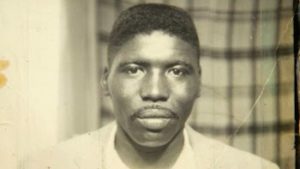
Jimmie Lee Jackson
*Jimmie Lee Jackson was born on this date in 1938. He was a Black minister and civil rights activist.
He was born in Marion, Alabama, a small town near Selma. His mother was Viola Jackson, and his grandfather was Cager Lee. After serving in the Vietnam War and spending time in Indiana, he returned to his hometown. He made about $6 a day as a laborer and woodcutter there. Jackson became a Baptist church deacon and fathered a daughter. Inspired by the American Civil Rights Movement, he tried to vote for the first time. He made several attempts to register as a voter but never got past the many hurdles set up to keep Blacks from casting ballots.
On February 18, 1965, Jackson participated in a peaceful night march in Marion, held to protest the arrest of James Orange, a field secretary for the Southern Christian Leadership Conference (SCLC). However, the segregationists who held power in Alabama opposed even nonviolent demonstrations. That night, the town's streetlights were turned off; under darkness, police and state troopers attacked the protesters with clubs, sending them fleeing in different directions.
Still pursued by officers, Jackson and other demonstrators entered a Mack's Café restaurant. There, Jackson was shot in the stomach by James Bonard Fowler, a state trooper. Witnesses recounted that Jackson had been protecting his mother and 82-year-old grandfather from the troopers. Fowler claimed he had been acting in self-defense, trying to keep Jackson from grabbing his gun.
The injured Jackson was taken to a local hospital and then sent to a hospital in Selma. He suffered for a week before dying from his infected wound on February 26, 1965, at the age of 26. Though Al Lingo, head of the state troopers, had sent an arrest warrant to Jackson while he was in the hospital, Fowler had faced no punishment or disciplinary action and was allowed to continue his job. On March 3, Martin Luther King Jr. spoke at Jackson's funeral, where he said that Jackson had been "murdered by the brutality of every sheriff who practices lawlessness in the name of the law."
Jackson's death also inspired civil rights leaders to hold the Selma to Montgomery March on March 7, 1965. A violent response awaited these demonstrators: When they arrived at Selma's Edmund Pettus Bridge, police used tear gas and batons against them. Images of the violence of the protest came to be known as "Bloody Sunday" were shared across the country, making the public more supportive of the civil rights struggle.